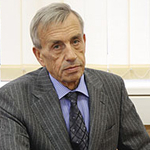
Gennadiy Latfullin
Participation in the activities of the Perm Forum
| April 20, 12:30-14:30 | Education discussion group |
Biography
- Doctor of Economics, Professor.
- Academic at the Russian Municipal Academy.
- Member-correspondent at the Academy of Economics and Business.
- Honored Employee of Higher Professional Education in the Russian Federation.
Two hundred years ago, while opening the famous Tsarskoe Selo Lyceum and addressing his first students, Alexander Petrovich Kunitsyn, one of the best professors of his time, said these remarkable words: “The love of glory and the Fatherland must be your guides.” The Tsarskoe Selo Lyceum was founded by M. M. Speranskiy to “educate the youth, especially those who intend to go into important parts of civil service.” It is the Pushkin Lyceum that had become the basis of the national education, and at that time it held the university standard in the civil service field. Professor Kunitsyn’s message has not lost its urgency since then.
This institute sees itself as the successor of the great lyceum task, the only difference being its refusing to provide an education exclusively to children in the nobility, which was normal at that time. Its specialty (training focus) is that “state and municipal administration” in this era must be accessible to any prepared secondary school graduate. This is one of the conditions necessary for democracy to reach the civil service.
This institute is constantly improving its educational methods, academic research, and educational work, and from year to year it strives to raise its standard of quality in training specialists. Special attention is paid to creating a corporate culture at the Institute for State Administration and Law, to encouraging a creative and friendly atmosphere, and creating a teaching/learning relationship between instructors and students. A unique professor/teaching staff is its most valuable aspect. The young instructors and promising academics who work in the institute’s departments are its strategic resources.
The Institute for State Administration and Law at the State University of Administration has been consistently working to consolidate its competitive advantages among other institutes of higher education in Russia by training specialists in the areas of state and municipal administration, municipal services management, migration management, and specialists in the field of jurisprudence. The Institute’s distinctive educational features are: fundamental academic training in economics and management along with a focus on the use of the acquired knowledge, skills and abilities in practice; a substantial spiritual and humanitarian component both during the training process and during extra-curricular educational work; close cooperation with federal and regional legislative and executive authorities, and with the Moscow government, prefectures, and district offices.
All are invited to enter the Institute for State Administration and Law at the State University of Administration. State and municipal officers are invited to take part in re-training programs and improve their qualifications. Entrepreneurs are also invited to the GR-Management Educational Programs.
- return_links(); ?>
-
Forum communication
-
Forum car
-
Sponsor
-
Sponsor
-
Sponsor
-
Sponsor
-
Sponsor
-
Sponsor
-
IT support
-
Sponsor
-
Sponsor
-
Sponsor
-
Sponsor
-
Sponsor
-
Sponsor
-
 Sponsor
Sponsor -
 Sponsor
Sponsor -
Sponsor
-
Sponsor
-
 Sponsor
Sponsor -
Partner
-
General media partner
-
General media partner
-
Forum TV
-
General internet partner
-
Forum online newspaper
-
Official media partner
-
Regional partner of the project
-
Official media partner
-
Official media partner
-
Official media partner
-
Official media partner
-
Official media partner
-
Multimedia partner
-
Official media partner
-
Official media partner
-
Official media partner
-
Official media partner
-
Official media partner
-
Official media partner
-
Official media partner
-
Official media partner
-
Official media partner












































